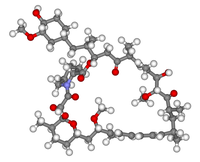
Photo from wikipedia
Children with aggressive pediatric solid tumors have poor outcomes and novel treatments are needed. Pediatric solid tumors demonstrate aberrant expression and activity of the fibroblast growth factor receptor (FGFR) family,… Click to show full abstract
Children with aggressive pediatric solid tumors have poor outcomes and novel treatments are needed. Pediatric solid tumors demonstrate aberrant expression and activity of the fibroblast growth factor receptor (FGFR) family, suggesting FGFR inhibitors may be effective therapeutic agents. AZD4547 is a multikinase inhibitor of the FGFR1–3 kinases, and we hypothesized that AZD4547 would be effective in pediatric solid tumor preclinical models. We evaluated the effects of AZD4547 on neuroblastoma, rhabdomyosarcoma, and Ewing sarcoma cells alone and in combination with STAT3 inhibition. Continuous live cell imaging was used to measure induction of apoptosis and effects on migration. Receptor inhibition and intracellular signaling were examined by western blotting. AZD4547 treatment resulted in decreased cell confluence, increased apoptosis and reduced cell migration in all tested cell lines. AZD4547 treatment led to decreased phosphorylation of signaling proteins involved in cell survival and apoptotic pathways and increased phosphorylation of STAT3, and treatment of cell lines with AZD4547 combined with STAT3 inhibition demonstrated increased efficacy. Sensitivity to AZD4547 appears to be mediated by effects on the Ras/MAPK and JAK/STAT pathways, and AZD4547 represents a potential novel therapeutic agent for children with solid tumors.
Journal Title: Investigational New Drugs
Year Published: 2020
Link to full text (if available)
Share on Social Media: Sign Up to like & get
recommendations!